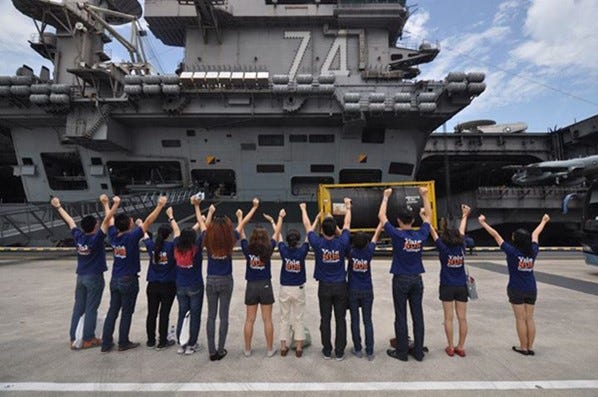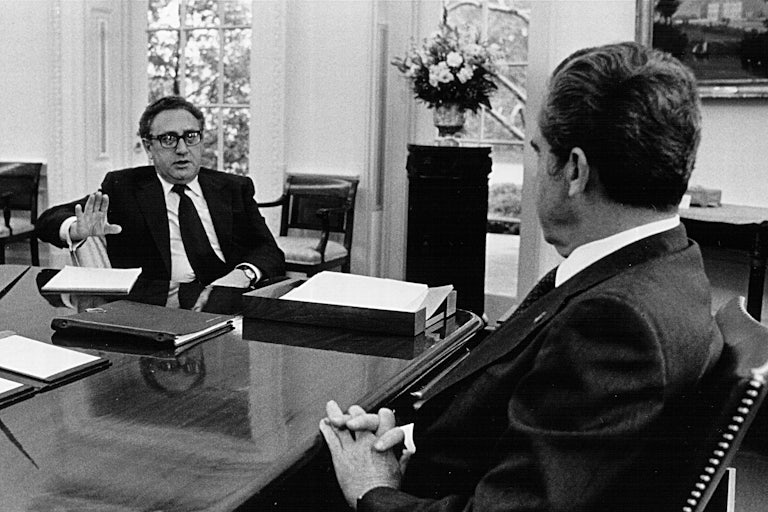Why foreign policy isn’t so ‘foreign’ anymore

A visit to the U.S.S. Stennis: Yale-National University of Singapore College Facebook page.
The word ‘foreign’ no longer comprehends as much as it eclipses of The United States’ increasingly fluid, precarious position in a global economy that has put state-based sovereignty and democratic institutions up for grabs. Yet most Americans are ill-prepared and ill-inclined to understand foreign policymaking. Our historically universalist, sometimes isolationist, sometimes missionary, sometimes self-directed civic-republican ideals don’t advance U.S. security or prosperity anymore, let alone global democratic life.
That disconnect between our global ambitions and our civic-republican self-regard has rattled liberal education at colleges such as Yale, which strove for more than two centuries to reconcile the arts and disciplines of liberal truth-seeking with the arts and disciplines of worldly power-wielding and wealth-making. I lived through the collapse of that balance and its finessing as a Yale undergraduate in the late 1960s and as a graduate student at Harvard from the autumn of 1969 through 1976 — i.e., during the Vietnam War and, decades later, as an instructor at Yale from 9/11 through our misadventures into Iraq and Afghanistan, where we won many of the battles but lost the wars, much as we’d done in Vietnam.
I’ve chronicled that collapse and its consequences for American national identity and security and for liberal education and liberal democracy. All of this happened amid economic, technological, and demographic sea changes, abroad and at home. Some of the following columns and essays address foreign policymaking directly, not least at the hands of Henry Kissinger but also in the Iraq and Afghanistan misadventures. Other columns describe foreign policy’s co-dependency with liberal education in venues such as Yale’s venture into and with Singapore and Yale’s “Grand Strategy” program.
How Yale Made and Unmade American Foreign Policy, 1965-2022

Yale’s ‘exemplary’ and embarrassing roles, then and now.
This overview, written in 2019 for my Class of 1969’s 50th Reunion book, notes that “Even if most of us weren’t thinking of getting into foreign policy as we entered the college in September, 1965, foreign policy would get into us, and the consequences would rattle Yalies in State, Defense, the CIA, and the White House. Now that the word ‘foreign’ eclipses more than it catches about the United States’ increasingly fluid, precarious position in a global economy amid unprecedented migrations, cultural upheavals, and nationalist reactions here and abroad, our youthful assumptions and experiences have been superseded at Yale, as well as in Washington.”
Yale’s fraught efforts to sustain its long prominence as a crucible of American global and civic leadership were embodied by its “Diplomat in Residence” from the late 1990s through 2021 — Charles Hill, a former top U.S. Foreign Service assistant to Secretaries of State Henry Kissinger and George Shultz. After watching Hill’s teaching and public advocacy, I reviewed his book, Grand Strategies, for Foreign Policy Magazine in 2010. I also criticized his propagation of the Yale Grand Strategy program’s premises and pedagogy in a long article on my website when he was at the height of his influence there. I posted most of it again on Salon in 2021, shortly after Yale held a memorial conference in his honor.
Grand Strategic Failure: Why Charlles Hill’s book is as morally suspect as his career. Foreign Policy magazine, 2010
Yale’s Grand Strategy Program tries to improve its illiberal pedagogy but is thwarted by its funders. Foreign Policy magazine, 2021.
Grand Strategy shouldn’t be so grandiose, Yale Daily News, 2021
Henry Kissinger and American Foreign Policy
 NATIONAL ARCHIVE / NEWSMAKERS / GETTY IMAGES
NATIONAL ARCHIVE / NEWSMAKERS / GETTY IMAGES
.
On several occasions I’ve assessed the foreign policy “realism” of Kissinger, who became an important influence at Yale after 9/11, owing to Charles Hill and to the historian John Gaddis, founders of the university’s Grand Strategy program. In 2014, I kept my cool in reviewing Kissinger’s World Order for the Los Angeles Review of Books. That book, written with assistance from Hill, surveys the dimming prospects of state-based sovereignty in international power relations. Richard Haass, president of the Council on Foreign Relations, assigned my review in his Introduction to International Relations course. (Find it at Class #23, next to a piece by Stephen Walt.)
Although Kissinger’s reflections are indeed often instructive, I criticized him strongly in this 2011 Dissent column for his ‘diplomatic’ review of Yale Grand Strategy Program director John Gaddis’ biography of George F. Kennan. (For “diplomatic,” read “conflict-of-interest-ridden”.) I criticized him again, commenting on revelations about Kissinger’s occasional savagery in strategic decision-making in this Huffington Post column, “Where Henry Kissinger’s Dark Wisdom Binds Him.”
In 2020, for The New Republic, I reviewed an intellectual biography of Kissinger by Barry Gewen, a deputy editor at The New York Times Book Review, whose apologia for Kissinger doubled down on Gewen’s own biases as an editor who had orchestrated a few too many overly indulgent reviews of Kissinger’s books, as well as reviews by Kissinger that were self-serving, as was his review of Gaddis’ Kennan biography. Bookmarks accurately characterized my review of Gewen’s book as a “PAN”.)
Blunders in Iraq, Afghanistan, and…?
Thucydiots (my coinage!), about Iraq War enthusiasts, for The American Prospect, 2004
Neoconservatives’ promotion of America’s biggest foreign-policy fiasco. A 2004 review for The Los Angeles Times of Stefan Halper and Jonathan Clarke’s America Alone, their damning conservative analysis of the neo-cons’ ardent blundering with George W. Bush. (For readers who don’t have LAT subscriptions, I present the review here as republished by the History News Network.)
These columns about Iran, 2009, foresaw what neocons didn’t see coming to America.
In 2009, one of my former Yale students, Cameron Abadi (in 2022, deputy editor at Foreign Policy magazine), was in his parents’ native Tehran, writing about the emergence of that year’s “Green Revolution” against the theocratic regime. I wrote a few columns relaying Cameron’s brave observations and reportage. {Vice President Joe “Loose Lips” Biden makes an appearance in one of these columns.)
Power and Appeasement, The Guardian, 2010 About a dubious response to neoconservatives’ even-more dubious crusades
Sorry, Robert Kagan, America Isn’t Superman, Washington Monthly, July 23, 2014. This short post links a 2-minute video (3rd-to-last paragraph) of Kagan’s balloon being popped in 2009 by then-French foreign-minister Dominique DeVillepin. Also in History News Network.
The Arab Spring’s False New Neocon Friends, TPM Cafe, February 2, 2011
What to learn from Stanley McChrystal’s (and neoconservatives) failed “war on poverty” in Afghanistan, The Washington Monthly, 2017
McChrystal’s Master-Stroke? By getting fired, has he set the state for an insurgency against Obama? What Obama may lose by dismissing him, June 24, 2010
Putin’s Ukraine Invasion Summons Europe’s Darkest Past, Salon, March 1, 2022
The Cold War and the Color Line, Washington Post, Feb 3, 2002. A (skeptical) assessment of Thomas Borstelmann’s argument that the American civil rights movement gained a lot of its ground when U.S. foreign-policymakers wanted to enhance American standing with new, post-colonial nations and the Soviets who were indulging or propagandizing them.
Liberal Educators’ Globe-Trotting with Illiberal Regimes
Innocents Abroad? This is one of my most-substantial critiques of such ventures, written for the journal of the Carnegie Council on Ethics & International Affairs, 2015. Carnegie podcast with me on this article and on liberal educators in illiberal societies, including the Yale-Singapore venture. This essay is being re-published in the anthology Normative Tensions: Academic Freedom in International Education.
Why globe-trotting universities serve diplomacy and markets, not democracy. OpenDemocracy, 2013
In 2021, Singapore indecorously ended its joint venture with Yale, just when, at the other end of Asia, the Taliban was ending Afghanistan’s entanglement with other Americans. The two debacles vindicated darkly and sadly my own grim prophecies about both. Asia Sentinel, September, 2021